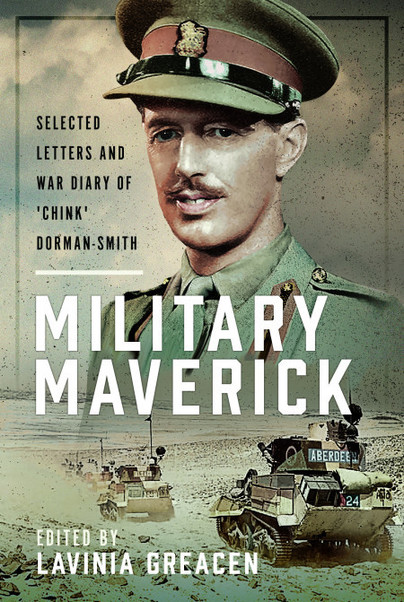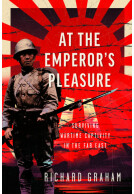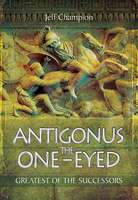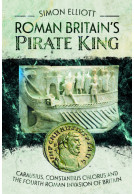Military Maverick (Hardback)
Selected Letters and War Diary of 'Chink' Dorman-Smith
Pages: 328
Illustrations: 8 mono illustrations
ISBN: 9781036102272
Published: 29th November 2024
(click here for international delivery rates)
Order within the next 11 hours to get your order processed the next working day!
Need a currency converter? Check XE.com for live rates
| Other formats available | Price |
|---|---|
| Military Maverick ePub (9.3 MB) Add to Basket | £18.99 |
A follow-up to the best-selling biography ‘Chink’, this selection from private letters and intimate war diary has the impact of a fresh ‘no holds barred’ autobiography. Dorman-Smith the man – flesh and blood – comes alive here on the page.
Provocative, irreverent, caustic and witty, his disdain for Churchill – and for the Establishment in general – increases as his military career unravels. Egotistical? Yes. Arrogant? Certainly. His own worst enemy? Perhaps. But Dorman-Smith’s grasp of tactics and strategy was unsurpassed, as his exchanges with Basil Liddell-Hart demonstrate.
Full of contradictions, he was externally reserved and inwardly super-sensitive. Growing up in style in Ireland and educated at public school in England, his religion was Catholic and he scorned any Anglo-Irish tag. His private life while rising up the Northumberland Fusiliers proved colourful, while a brief dalliance with the IRA in the 1950s never endangered his vow of silence over the Enigma/Ultra secret.
This book gives a marvellous picture of personal war experience in two world wars, from RMC Sandhurst and life in the trenches, via the Staff College to high command in Egypt and India between the wars, until service in North Africa under Wavell began, and working side by side with Auchinleck at the First Battle of El Alamein. That would lead to confrontation with Churchill and Brooke, and subsequent breakout from Anzio under fire. Readers will know what it was like to survive the trenches, to serve in HQ as crises arose, and to have command involving losses - the reality of war is dramatic and moving.
The First Battle of El Alamein, fought under Auchinleck in the emergency that dangerous summer of 1942, was to be followed within three months by Montgomery’s celebrated battle and its consequent fame. The important argument of Military Maverick, however, is that First Alamein was the real turning point in the Desert War, and that makes Dorman-Smith’s account even more valuable.
The letters and diary entries are linked by commentary and explanation by the editor Lavinia Greacen, and by the military historian John Lee.
As the only candidate, before or since, ever to have achieved 100% in the tactics paper in the entrance examination for the army Staff College Eric Dorman-Smith ought perhaps to be better known to posterity, but as history is written by the victors, and as ‘Chink’ (nicknamed after the antelope mascot of his regiment) had managed to alienate most of them, it is not surprising that he has almost disappeared except to a few military historians. That while at the Staff College he ostentatiously burned all the precis compiled by one of the instructors, one Lieutenant Colonel BL Montgomery, would be remembered by a man who never forgot a grudge. There is only one good biography of him, ‘Chink – A Biography’ by Lavinia Greacen, published in 1989 and rightly lauded as a masterly account of the man and his times, describing his undoubted intellect and abilities while also recognising his flaws. It deservedly became a best seller and was translated into several languages. After that brief flowering, Chink’s life once more receded into obscurity.
Aspects of History - Gordon Corrigan, author of Mud, Blood and Poppycock - Britain and the First World War, and The Second World War - A Military History
Now Greacen has returned to the fray with ‘Military Maverick’, the selected letters and war diary of Chink, ranging from his time as a young officer on the Western Front and Italy of 1914-18, through post-war pre-partition Ireland and command of a battalion in the Middle East to his service in the Second World War. It is this latter period that takes up most of the book, and fascinating it is, with his diary entries showing Chink’s inner thoughts where he rails against what he sees as a dinosaur mentality and slavish adherence to the orthodox among some politicians (particularly Churchill) and senior officers (including, amongst lots of others, Brooke, Alexander, Jumbo Wilson, Ritchie and Montgomery, although surprisingly temperate in his assessments of the latter). He is particularly vehement about the lack of recognition of Auchinleck’s talents and his stopping of the Axis advance at the First Battle of Alamein, with all the credit subsequently given to Montgomery’s subsequent battle, rarely referred to as the ‘second’. He considers the treatment meted out to Auchinleck, and to himself, then a local major general, in the ‘Cairo purge’ of August 1942, to be the result of a conspiracy at the highest level, although he says little about Corbett who was also treated most unfairly. As a brigade commander in England he criticises everything from unrealistic training to the influence of padres and army food. His removal from brigade command and reversion to his substantive rank of colonel irritates, (understandably), particularly when he is kept in the dark as to any future employment.
He is cheered by his eventual posting as a brigade commander to Anzio, despite his divisional commander telling him bluntly that he had not wanted him. There he completes two successful brigade operations and is hopeful of further advancement, when he is abruptly removed from command, rusticated to England and permitted to retire. His letters support his diary entries, and here his correspondents included Ernest Hemingway, Basil Liddell Hart, Corelli (Bill) Barnett and the biographers Tommy Thompson and Jack Connell. In retirement he dabbled in politics, firstly in England and then in his ancestral home in Ireland, where he changed his name to Dorman O’Gowan, and became a supporter of and collaborator with the ‘old’ IRA (he would never have approved of the Provisionals). The text of the book is well supported by extensive notes by the author and additions by John Lee, a highly regarded historian of both world wars.
This book is a fascinating insight into the mind of a far thinking officer with, in many respects, a brilliant mind, who was undoubtedly unfairly treated, but who brought much of his misfortune on himself. Perhaps the moral might be that if you are cleverer than your superiors you should endeavour to avoid them finding out.















